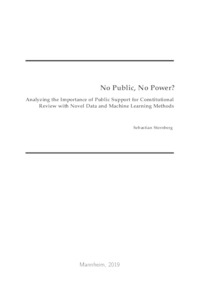|
No public, no power? Analyzing the importance of public support for constitutional review with novel data and machine learning methods
Sternberg, Sebastian
![[img]](https://madoc.bib.uni-mannheim.de/52329/1.hassmallThumbnailVersion/Dissertation_Sebastian_Sternberg.pdf)  Vorschau |
|
PDF
Dissertation_Sebastian_Sternberg.pdf
- Veröffentlichte Version
Download (4MB)
|
|
URL:
|
https://madoc.bib.uni-mannheim.de/52329
|
|
URN:
|
urn:nbn:de:bsz:180-madoc-523294
|
|
Dokumenttyp:
|
Dissertation
|
|
Erscheinungsjahr:
|
2019
|
|
Ort der Veröffentlichung:
|
Mannheim
|
|
Hochschule:
|
Universität Mannheim
|
|
Gutachter:
|
Gschwend, Thomas
|
|
Datum der mündl. Prüfung:
|
17 Juli 2019
|
|
Sprache der Veröffentlichung:
|
Englisch
|
|
Einrichtung:
|
Fakultät für Sozialwissenschaften > Politische Wissenschaft, Quantitative Sozialwissenschaftliche Methoden (Gschwend 2007-)
Außerfakultäre Einrichtungen > GESS - CDSS (SOWI)
|
|
Fachgebiet:
|
320 Politik
|
|
Freie Schlagwörter (Englisch):
|
constitutional courts , public opinion , legislative noncompliance , machine learning
|
|
Abstract:
|
Constitutional review is a central feature of liberal democracy. However, with neither
the power of the purse nor the sword, the mere presence of constitutional courts does
not automatically imply the effective exercise of judicial authority. Courts must rely on
elected officials for the implementation of their rulings. The ability of a court to ensure
that government officials faithfully comply with judicial decisions critically depends
on the existence of sufficient public support for the court and the public’s ability to
monitor legislative responses to judicial decisions.
In this dissertation, I study the importance of public support for the relationship
between court-government and court-public. I draw on the judicial politics literature
on separation of powers, public support and legislative noncompliance and extend
existing theory in two regards. First, I argue that not all courts possess the sufficient
level of public support necessary to ensure legislative compliance. Varying degrees
of public support strongly affect the leverage that courts possess in judicial-legislative
and judicial-public interactions. Second, I argue that courts actively take measures
in the form of the institutional tools at their disposal when they expect legislative
noncompliance. One such tool is decision language, whose strategic usage allows
judges to pressure the government or hide likely noncompliance from public view, if
necessary.
I test these arguments empirically by combining classical inferential methods such as
survey experiments with novel data on court decision-making and methodologies from
the field of machine learning and computational linguistic. Throughout all chapters, I
employ a comparative perspective and test my arguments using data on the German
Federal Constitutional Court, a court with strong and robust levels of public support,
and the less popular French Conseil Constitutionnel.
My empirical evidence shows that considering varying degrees of public support and
the institutional tools of judges indeed helps to generate a more accurate picture of how judges behave in judicial-legislative and judicial-public interactions. Three conclusions
are drawn. First, court decisions can legitimize public policies, albeit only if the court
itself is perceived as a legitimate institution. Second, courts are more attentive to the
political environment of a decision than previously thought: depending on their degree
of public support, they actively adapt the language of their decisions as a function of
the risk of noncompliance and their institutional support. Third, public support and
other political context factors are important for judicial decision-making not only from
an inferential but also from a predictive perspective.
The results of my analyses confirm that public support plays a crucial role for courts’
ability to effectively exercise constitutional review, as well as highlighting the benefits
of increased differentiation of constitutional courts institutional tools and their diffuse
support from a comparative view. Therefore, my results have implications for the
growing literature on strategic courts using their institutional tools to address potential
noncompliance and the general awareness of judges for their institutional reputation.
Overall, this project offers new perspectives on the most important resource of judges –
their public support – and has important implications not only for research on judicial
politics but also for the efficacy of constitutional review in a constitutional state, and
thus the sustainability of liberal democracy.
|
 | Dieser Eintrag ist Teil der Universitätsbibliographie. |
 | Das Dokument wird vom Publikationsserver der Universitätsbibliothek Mannheim bereitgestellt. |
 Suche Autoren in Suche Autoren in
Sie haben einen Fehler gefunden? Teilen Sie uns Ihren Korrekturwunsch bitte hier mit: E-Mail
Actions (login required)
 |
Eintrag anzeigen |
|
|
